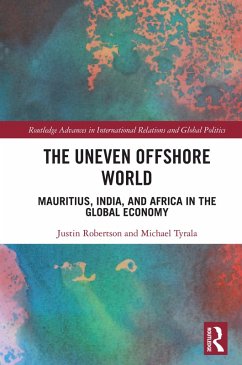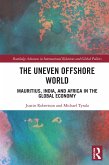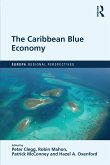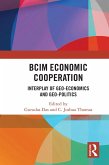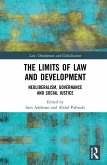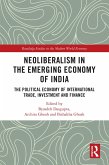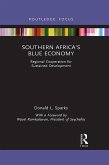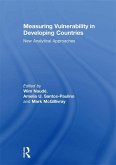Justin Robertson, Michael Tyrala
The Uneven Offshore World (eBook, PDF)
Mauritius, India, and Africa in the Global Economy
43,95 €
43,95 €
inkl. MwSt.
Sofort per Download lieferbar

22 °P sammeln
43,95 €
Als Download kaufen

43,95 €
inkl. MwSt.
Sofort per Download lieferbar

22 °P sammeln
Jetzt verschenken
Alle Infos zum eBook verschenken
43,95 €
inkl. MwSt.
Sofort per Download lieferbar
Alle Infos zum eBook verschenken

22 °P sammeln
Justin Robertson, Michael Tyrala
The Uneven Offshore World (eBook, PDF)
Mauritius, India, and Africa in the Global Economy
- Format: PDF
- Merkliste
- Auf die Merkliste
- Bewerten Bewerten
- Teilen
- Produkt teilen
- Produkterinnerung
- Produkterinnerung

Bitte loggen Sie sich zunächst in Ihr Kundenkonto ein oder registrieren Sie sich bei
bücher.de, um das eBook-Abo tolino select nutzen zu können.
Hier können Sie sich einloggen
Hier können Sie sich einloggen
Sie sind bereits eingeloggt. Klicken Sie auf 2. tolino select Abo, um fortzufahren.

Bitte loggen Sie sich zunächst in Ihr Kundenkonto ein oder registrieren Sie sich bei bücher.de, um das eBook-Abo tolino select nutzen zu können.
Robertson and Tyrala provides a theoretical and empirical analysis of emerging markets and the offshore economic system. An insightful study for scholars of international political economy.
- Geräte: PC
- mit Kopierschutz
- eBook Hilfe
Andere Kunden interessierten sich auch für
![The Uneven Offshore World (eBook, ePUB) The Uneven Offshore World (eBook, ePUB)]() Justin RobertsonThe Uneven Offshore World (eBook, ePUB)43,95 €
Justin RobertsonThe Uneven Offshore World (eBook, ePUB)43,95 €![The Caribbean Blue Economy (eBook, PDF) The Caribbean Blue Economy (eBook, PDF)]() The Caribbean Blue Economy (eBook, PDF)33,95 €
The Caribbean Blue Economy (eBook, PDF)33,95 €![BCIM Economic Cooperation (eBook, PDF) BCIM Economic Cooperation (eBook, PDF)]() BCIM Economic Cooperation (eBook, PDF)42,95 €
BCIM Economic Cooperation (eBook, PDF)42,95 €![The Limits of Law and Development (eBook, PDF) The Limits of Law and Development (eBook, PDF)]() The Limits of Law and Development (eBook, PDF)43,95 €
The Limits of Law and Development (eBook, PDF)43,95 €![Neoliberalism in the Emerging Economy of India (eBook, PDF) Neoliberalism in the Emerging Economy of India (eBook, PDF)]() Neoliberalism in the Emerging Economy of India (eBook, PDF)40,95 €
Neoliberalism in the Emerging Economy of India (eBook, PDF)40,95 €![Southern Africa's Blue Economy (eBook, PDF) Southern Africa's Blue Economy (eBook, PDF)]() Donald L. SparksSouthern Africa's Blue Economy (eBook, PDF)20,95 €
Donald L. SparksSouthern Africa's Blue Economy (eBook, PDF)20,95 €![Measuring Vulnerability in Developing Countries (eBook, PDF) Measuring Vulnerability in Developing Countries (eBook, PDF)]() Wim NaudeMeasuring Vulnerability in Developing Countries (eBook, PDF)57,95 €
Wim NaudeMeasuring Vulnerability in Developing Countries (eBook, PDF)57,95 €-
-
-
Robertson and Tyrala provides a theoretical and empirical analysis of emerging markets and the offshore economic system. An insightful study for scholars of international political economy.
Dieser Download kann aus rechtlichen Gründen nur mit Rechnungsadresse in A, B, BG, CY, CZ, D, DK, EW, E, FIN, F, GR, HR, H, IRL, I, LT, L, LR, M, NL, PL, P, R, S, SLO, SK ausgeliefert werden.
Produktdetails
- Produktdetails
- Verlag: Taylor & Francis eBooks
- Seitenzahl: 196
- Erscheinungstermin: 24. März 2022
- Englisch
- ISBN-13: 9781000547870
- Artikelnr.: 63648607
- Verlag: Taylor & Francis eBooks
- Seitenzahl: 196
- Erscheinungstermin: 24. März 2022
- Englisch
- ISBN-13: 9781000547870
- Artikelnr.: 63648607
- Herstellerkennzeichnung Die Herstellerinformationen sind derzeit nicht verfügbar.
Justin Robertson is an associate professor in the Department of Asian and International Studies at the City University of Hong Kong. His most recent research explores the extent to which hedge funds, private equity funds, and offshore structures are materializing in emerging markets.
Michael Tyrala is a postdoctoral fellow at the Institute for Emerging Market Studies of the Hong Kong University of Science and Technology. His research focuses on the historical and contemporary trajectories of the global offshore economy and its evolving impact on the global capitalist system.
Michael Tyrala is a postdoctoral fellow at the Institute for Emerging Market Studies of the Hong Kong University of Science and Technology. His research focuses on the historical and contemporary trajectories of the global offshore economy and its evolving impact on the global capitalist system.
List of Figures
List of Tables
List of Boxes
List of Abbreviations
1 Introduction
Larger debates and research questions
Argument and significance
Case selection
Structure of the book
2 Analytical framework part one: World-systems analysis, global finance, and regional specialization in the global offshore economy
World-systems analysis
The rise of global finance
Regional hubs in a global world
3 Analytical framework part two: Growing resistance, new global standards, and the uneven nature of the offshore world
Accommodation and resistance at multiple levels
New global standards and the continuing role of national factors
The multiple hierarchies of the offshore world and consolidated survivor OFCs
4 A case study of the Mauritius-India offshore relationship
The origins of Mauritius as an OFC for India
The Vodafone case
The historical importance of economic factors
The historical importance of political factors
Explaining the reversal of the India-Mauritius policy
5 A case study of the Mauritius-Africa offshore relationship
Key historical points
The role of international factors
The role of domestic factors
The politics of contestation
Re-evaluating India's offshore change
6 The significance of the case studies for the political economies of India, Africa, and Mauritius
The significance of Indian developments
The significance of African developments
The significance of Mauritian developments
The potential of the African market
The potential of new financial industries
The potential of new entry points into the Indian market
Mauritius's comparative advantages
Arrested development and OFCs
7 Conclusion
Developments that would put into question the findings of the book
Future research questions
References
Index
List of Tables
List of Boxes
List of Abbreviations
1 Introduction
Larger debates and research questions
Argument and significance
Case selection
Structure of the book
2 Analytical framework part one: World-systems analysis, global finance, and regional specialization in the global offshore economy
World-systems analysis
The rise of global finance
Regional hubs in a global world
3 Analytical framework part two: Growing resistance, new global standards, and the uneven nature of the offshore world
Accommodation and resistance at multiple levels
New global standards and the continuing role of national factors
The multiple hierarchies of the offshore world and consolidated survivor OFCs
4 A case study of the Mauritius-India offshore relationship
The origins of Mauritius as an OFC for India
The Vodafone case
The historical importance of economic factors
The historical importance of political factors
Explaining the reversal of the India-Mauritius policy
5 A case study of the Mauritius-Africa offshore relationship
Key historical points
The role of international factors
The role of domestic factors
The politics of contestation
Re-evaluating India's offshore change
6 The significance of the case studies for the political economies of India, Africa, and Mauritius
The significance of Indian developments
The significance of African developments
The significance of Mauritian developments
The potential of the African market
The potential of new financial industries
The potential of new entry points into the Indian market
Mauritius's comparative advantages
Arrested development and OFCs
7 Conclusion
Developments that would put into question the findings of the book
Future research questions
References
Index
List of Figures
List of Tables
List of Boxes
List of Abbreviations
1 Introduction
Larger debates and research questions
Argument and significance
Case selection
Structure of the book
2 Analytical framework part one: World-systems analysis, global finance, and regional specialization in the global offshore economy
World-systems analysis
The rise of global finance
Regional hubs in a global world
3 Analytical framework part two: Growing resistance, new global standards, and the uneven nature of the offshore world
Accommodation and resistance at multiple levels
New global standards and the continuing role of national factors
The multiple hierarchies of the offshore world and consolidated survivor OFCs
4 A case study of the Mauritius-India offshore relationship
The origins of Mauritius as an OFC for India
The Vodafone case
The historical importance of economic factors
The historical importance of political factors
Explaining the reversal of the India-Mauritius policy
5 A case study of the Mauritius-Africa offshore relationship
Key historical points
The role of international factors
The role of domestic factors
The politics of contestation
Re-evaluating India's offshore change
6 The significance of the case studies for the political economies of India, Africa, and Mauritius
The significance of Indian developments
The significance of African developments
The significance of Mauritian developments
The potential of the African market
The potential of new financial industries
The potential of new entry points into the Indian market
Mauritius's comparative advantages
Arrested development and OFCs
7 Conclusion
Developments that would put into question the findings of the book
Future research questions
References
Index
List of Tables
List of Boxes
List of Abbreviations
1 Introduction
Larger debates and research questions
Argument and significance
Case selection
Structure of the book
2 Analytical framework part one: World-systems analysis, global finance, and regional specialization in the global offshore economy
World-systems analysis
The rise of global finance
Regional hubs in a global world
3 Analytical framework part two: Growing resistance, new global standards, and the uneven nature of the offshore world
Accommodation and resistance at multiple levels
New global standards and the continuing role of national factors
The multiple hierarchies of the offshore world and consolidated survivor OFCs
4 A case study of the Mauritius-India offshore relationship
The origins of Mauritius as an OFC for India
The Vodafone case
The historical importance of economic factors
The historical importance of political factors
Explaining the reversal of the India-Mauritius policy
5 A case study of the Mauritius-Africa offshore relationship
Key historical points
The role of international factors
The role of domestic factors
The politics of contestation
Re-evaluating India's offshore change
6 The significance of the case studies for the political economies of India, Africa, and Mauritius
The significance of Indian developments
The significance of African developments
The significance of Mauritian developments
The potential of the African market
The potential of new financial industries
The potential of new entry points into the Indian market
Mauritius's comparative advantages
Arrested development and OFCs
7 Conclusion
Developments that would put into question the findings of the book
Future research questions
References
Index
